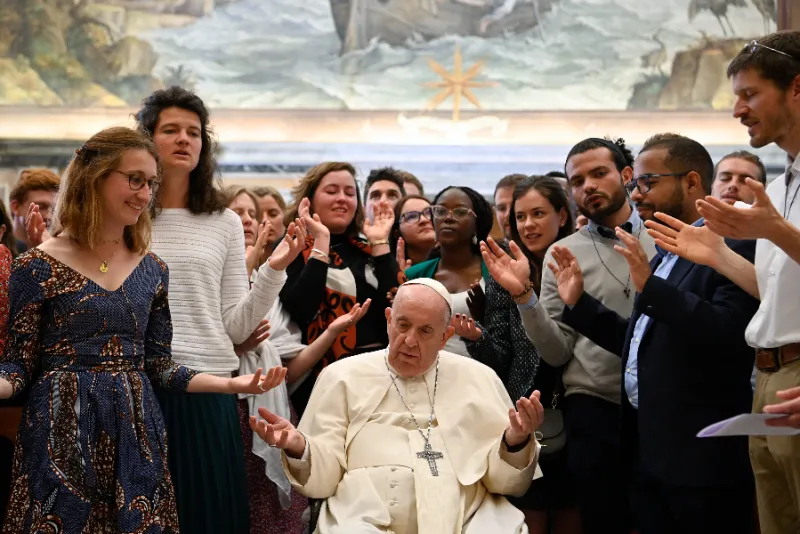
Vatican City, May 16, 2022 / 08:20 am (CNA).
Pope Francis on Monday urged young Christians engaged in politics to promote fraternity, while shunning “violent confrontation” and ideology.
The pope outlined his vision for the renewal of politics in a May 16 address to members of the Chemin Neuf Politics Fraternity, which brings together people aged 18 to 35 seeking to “be active in politics according to the heart of God.”
He gave the young people present in the Vatican’s Clementine Hall three watchwords — encounter, reflection, and action — and encouraged them to show “unconditional acceptance and respect” for others.
“Without such a change of heart, politics often risks turning into a violent confrontation, where people try to impose their own ideas and pursue particular interests over the common good, contrary to the principle that ‘unity prevails over conflict,’” he said, referring to a maxim his 2013 apostolic exhortation Evangelii gaudium.
The pope, who has been making his public appearances in a wheelchair since May 5 due to a torn ligament in his right knee, invoked the 18th-century statesman Edmund Burke.
He recalled that the author of “Reflections on the Revolution in France” told his constituents after he was elected to the British Parliament that he would not only serve their interest but also “the interest of the entire country, the general good.”
The pope said: “As Christians, we recognize that politics is practiced not only through encounter, but also through shared reflection in the pursuit of this general good, not simply through the clash of differing and often opposed interests.”
He added: “Our own compass for advancing this common project is the Gospel, which brings to the world a profoundly positive vision of humanity as loved by God.”
The Chemin Neuf Politics Fraternity is part of the Chemin Neuf Community, which was founded in Lyon, France, in 1973 and describes itself as a Catholic community with an ecumenical vocation.
Members of the international fraternity issued a manifesto in Poland in 2016 recalling that Pope Pius XI described politics as “the highest form of charity” and committing themselves to strive “for justice and peace, through our political commitment.”
The pope highlighted the group’s “efforts on behalf of migrants and ecology,” as well as an initiative in which members “have chosen to live together in a working-class quarter of Paris, in order to listen to the voices of the poor.”
“That is a Christian way of engaging in political life,” he commented. “Don’t forget these things, that realities are more important than ideas: politics cannot be practiced with ideology. That the whole is greater than the part, and that unity prevails over conflict. Always seek unity and do not get lost in conflict.”
If you value the news and views Catholic World Report provides, please consider donating to support our efforts. Your contribution will help us continue to make CWR available to all readers worldwide for free, without a subscription. Thank you for your generosity!
Click here for more information on donating to CWR. Click here to sign up for our newsletter.





“Don’t forget these things, that realities are more important than ideas: politics cannot be practiced with ideology. That the whole is greater than the part, and that unity prevails over conflict. Always seek unity and do not get lost in conflict” (The Roman Pontiff).
A practical admonition, workable. The model is Joe Biden. Biden placates the Pontiff’s expectations as the realpolitik apostate who ironically claims Catholicism. Ideology, code for Catholic doctrine regardless of its identity with natural law, the basic of jurisprudence assumes justice in deliberation during legislation. This, the pursuit of justice, the responsibility to choose what is just, the good, is, for Francis and model politician Biden rancid ideology.
Unfortunately, based on prolonged observation, there can be no other interpretation.
Young people – they are future stewards of Planet Earth, our Common Home. May each and every young person be blessed with a happy present and a bright future.
We read: “Members of the international fraternity [Chemin Neuf Community] issued a manifesto in Poland in 2016 recalling that Pope Pius XI described politics as “the highest form of charity” and committing themselves to strive ‘for justice and peace, through our political commitment.'”
Yes, and more. The German sociologist (early 19th century), Max Weber, in his “Politics as a Vocation,” offered a few relevancies: ” Politics is a strong and slow boring of hard boards. It takes both passion and perspective,” so, the moral virtue (!) of fortitude along with justice, plus temperance and the art of prudential judgment.
And, then, in a closely related work: “The primary task of a useful teacher is to teach his student to recognize ‘inconvenient’ facts,” so, for Catholics and all Christians, the natural law as now explicitly included in the Magisterium (the moral absolutes in the Gospels, as set forth in detail in Veritatis Splendor, n. 115).
And, citing John Stewart Mill “If one proceeds from pure experience, one arrives at polytheism;” this insight as clarifying the limits of some versions of “fraternity.”
And maybe this summary insight, too, from the founder of Aid to the Church in Need (Fr. Werenfried van Straaten): “no peace without justice, AND no justice without truth.”